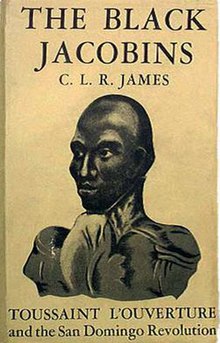 Cover of the 1st edition | |
| Author | C. L. R. James |
|---|---|
| Subject | Haitian Revolution |
| Genre | History |
| Published | 1938 |
| Publisher | Secker & Warburg Ltd |
| Publication place | United Kingdom |
| Media type | |
The Black Jacobins: Toussaint L'Ouverture and the San Domingo Revolution is a 1938 book by Trinidadian historian C. L. R. James, and is a history of the Haitian Revolution of 1791–1804.
He went to Paris to research this work, where he met Haitian military historian Alfred Auguste Nemours. James's text places the revolution in the context of the French Revolution, and focuses on the leadership of Toussaint L'Ouverture, who was born a slave but rose to prominence espousing the French Revolutionary ideals of liberty and equality. These ideals, which many French revolutionaries did not maintain consistently with regard to the black humanity of their colonial possessions, were embraced, according to James, with a greater purity by the persecuted blacks of Haiti; such ideals "meant far more to them than to any Frenchman."[1]
James examines the brutal conditions of slavery as well as the social and political status of the slave-owners, poor or "small" whites, and "free" blacks and mulattoes leading up to the Revolution. The book explores the dynamics of the Caribbean economy and the European feudal system during the era before the Haitian Revolution, and places each revolution in comparative historical and economic perspective.
Toussaint L'Ouverture becomes a central and symbolic character in James's narrative of the Haitian Revolution. His complete embodiment of the revolutionary ideals of the period was, according to James, incomprehensible even to the revolutionary French, who did not seem to grasp the urgency of these ideals in the minds and spirits of a people rising from slavery. L'Ouverture had defiantly asserted that he intended "to cease to live before gratitude dies in my heart, before I cease to be faithful to France and to my duty, before the god of liberty is profaned and sullied by the liberticides, before they can snatch from my hands that sword, those arms, which France confided to me for the defence of its rights and those of humanity, for the triumph of liberty and equality."[1]
The French bourgeoisie could not understand this motivation, according to James, and mistook it for rhetoric or bombast.[1] "Rivers of blood were to flow before they understood," James writes.[1]
James wrote in The Black Jacobins that the "cruelties of property and privilege are always more ferocious than the revenges of poverty and oppression. For the one aims at perpetuating resented injustice, the other is merely a momentary passion soon appeased."[2]
